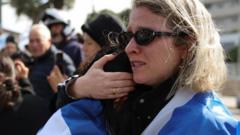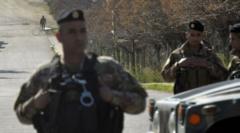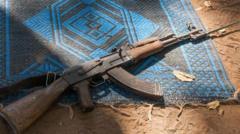In a recent ceasefire swap, three Israeli hostages were released by Hamas in exchange for 369 Palestinian prisoners, sparking discussions on the implications for the broader conflict.**
Ceasefire Swap: Hostages Released Amid Continued Tensions in Israel-Palestine Conflict**

Ceasefire Swap: Hostages Released Amid Continued Tensions in Israel-Palestine Conflict**
Israeli and Palestinian prisoners exchanged as part of a ceasefire agreement show the complexities of the ongoing conflict.**
Hamas has recently executed a hostage exchange, releasing three Israeli captives in return for the liberation of 369 Palestinian detainees. This exchange forms part of the ceasefire arrangement established between Israel and Hamas last month. The hostages released include American-Israeli Sagui Dekel-Chen, 36, Argentinian-Israeli Yair Horn, 46, and Russian-Israeli Alexander Troufanov, 29.
The ongoing exchanges have seen a total of 19 hostages freed from Gaza alongside over 1,000 Palestinian prisoners as part of the ongoing ceasefire, which commenced on January 19, 2025. By the conclusion of this first six-week phase, an anticipated total of 33 hostages and about 1,900 prisoners are expected to be released.
The most recent swap, taking place in Khan Younis, Gaza, marks the sixth incident since the initiation of the ceasefire. The Israeli hostages were briefly presented before a gathering of Palestinians and, unlike previous releases, appeared to be in better general condition. They were subsequently transported by military helicopter to a central Israeli hospital for medical evaluation and family reunification.
Following their release, Israeli President Isaac Herzog criticized the event, labeling the situation a "despicable and cynical ceremony." Defence Minister Israel Katz emphasized the ongoing collaborative efforts with the United States to secure the release of all hostages.
Among those swapped, most Palestinian detainees were transported back to Gaza, with some sent to the West Bank. Reports indicated that several released individuals required medical attention due to pre-existing health issues, highlighting concerns about their treatment during detention.
Earlier this week, Hamas raised concerns about potential violations of the terms of the agreement, suggesting a delay in future hostages' release. In the face of these tensions, military actions may resume should negotiations falter. As part of the ceasefire, Hamas is scheduled to release an additional 14 hostages, although there are worries regarding the conditions of several Israeli captives.
This negotiation round follows a tumultuous period marked by heightened violence since the Hamas attacks on October 7, 2023, leading to substantial casualties on both sides and further complicating the already intricate landscape of Israeli-Palestinian relations.





















